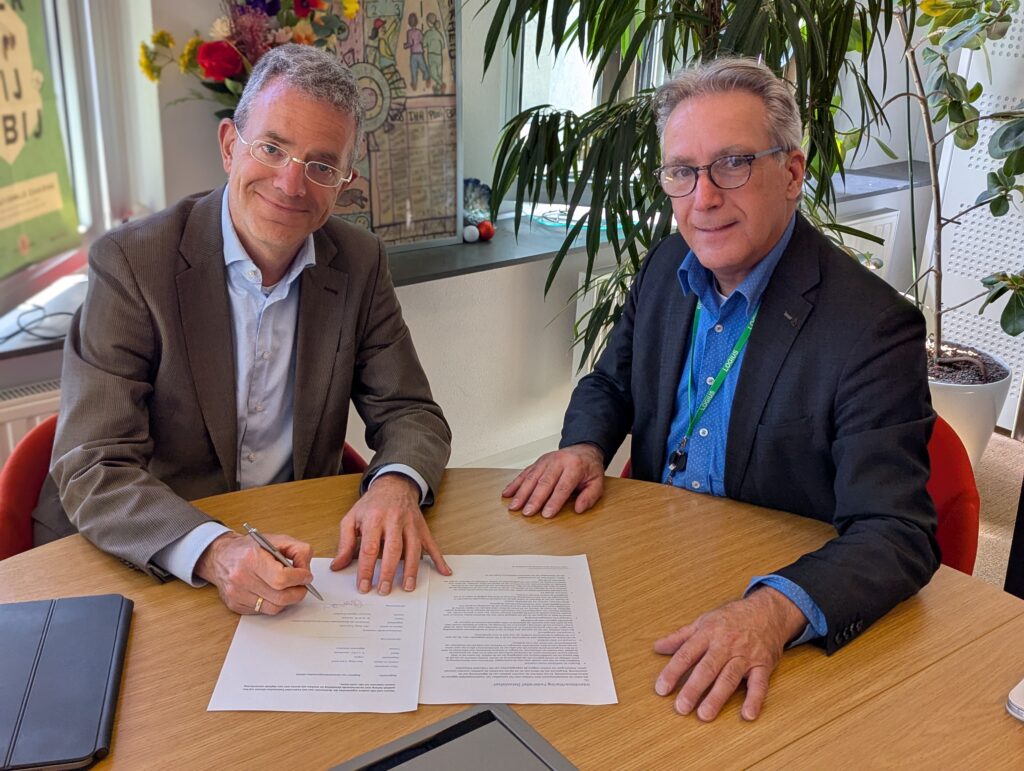
On 10 July 2025, Logius and the Ministry of the Interior and Kingdom Relations (BZK) signed a letter of intent for the integration of the Register of Government Organisations (ROO) into the Federated Data System (FDS). This signifies a new milestone in the journey towards improved data exchange within the government.
Bert Voorbraak, Managing Director of Logius, and Mark Vermeer, Director of Digital Government at BZK, have come together to sign the letter of intent. In the lead-up to this official moment, they discuss the background and significance of this letter of intent in a meeting room on Turfmarkt in The Hague.
ROO and FDS
Natural point in time
“What I find very important is the image of working as 1 government,” Bert Voorbraak says. “As far as I’m concerned, it is a fundamental part of the Dutch Digitalisation Strategy.” Mark Vermeer adds, “As a government, you can only present a unified front to citizens and businesses if you have the same information at your disposal. And that’s where the Federated Data System comes in.”
The timing of this declaration of intent is no coincidence. “The Dutch Digitalisation Strategy (Dutch, English version in development) was published on 4 July 2025, making this a natural moment in time for further steps towards an integrated government”, Vermeer explains. “From a practical standpoint, ROO can also be involved since there is an API (Dutch) that aligns with the FDS design. Moreover, unlike other sources, this involves relatively straightforward data with relatively straightforward applications.”
An up-to-date register ensures reliable information
“It is important to keep the register up to date,” emphasises Voorbraak. “Developments in government occur rapidly, such as the merging of municipalities. For instance, I live in the ‘Gooi’ area, where 3 Water Authorities are being split up. Such changes demonstrate this work is not limited to setting up a register on a one-off basis. Keeping the register up to date is crucial to the trustworthiness of this source. Reliability is central to this topic.”
From State Almanac to digital register
The complexity of (maintaining) data sources in government is nothing new. During the interview, Mark Vermeer smiles as he browses through the 1st State Almanac from 1860. “This is brilliant! For example, you can look up who is a member of the nobility! Oh, and now I notice the Department of Justice. The Secretary-General is Mr De Jonge.”
The digital evolution has, of course, drastically improved the accessibility of this data. Vermeer closes the book, places it on the table in front of him and stares at it for a moment. “This almanac remains the most charming, of course, but a register that is accessible according to standards remains the quickest. The government now encompasses many organisations in various legal forms, and the register helps to create clarity.”
Joint responsibility
An essential aspect of the ROO joining the FDS is the agreement on roles and responsibilities. Although KOOP (Knowledge and Exploitation Centre for Official Government Publications, part of Logius) is the administrator and therefore plays a pivotal role, the responsibility for keeping the data in the ROO up to date remains with the owners of the data.
“The management of the register is a joint responsibility,” Voorbraak emphasises. “We do not assume the responsibilities of other organisations, but remind them of their role. Of course, we are happy to assist in this. However, each organisation is responsible for keeping its data up to date.”
Importance to the government
In addition to the benefits of the ROO participating in the FDS for citizens and businesses, Voorbraak also recognises its value within the government itself: “It is also important for us as government organisations to understand each other and have the right information at the right time. Given my numerous connections with various government parties, I’ve noticed that we don’t know each other very well. A register such as the ROO can play an additional role in this and assist us in making better decisions more swiftly.”
Lessons for other organisations
Vermeer offers an important lesson for other organisations considering joining the FDS. “Data owners, in other words, those who maintain databases, do not always have a complete overview of who else is using their data, to what extent and for what purpose. That is why it is important to invest in making data accessible following the FDS agreements.”
Voorbraak encourages other organisations to join the FDS as well. “Please, do! And don’t take the liberty of distancing yourself from a register such as the ROO, even if you are formally entitled to do so. Doing so makes things incredibly difficult for us as a government.”
FDS as a driver for future public services
In the longer term, Vermeer sees the FDS as a driver for further government modernisation: “The FDS is all about the standardised and responsible sharing and use of data between different domains. This approach aligns with the ambition to work as 1 government. And to provide much more effective and efficient services to citizens and businesses, directly or indirectly.”
The FDS is being developed within the framework of the Intergovernmental Data Strategy (IBDS). The IBDS was set up to leverage opportunities for responsible data use and to resolve bottlenecks. The ROO’s involvement in the FDS signifies a crucial step in implementing the IBDS and the recently launched Dutch Digitalisation Strategy. Data exchange and collaboration within a unified government are vital to future public services. Voorbraak stresses the government’s responsibility to deliver this for society. “Let’s not each go down our path again but work together on this.”
“I certainly hope that many data controllers will follow this example and also sign the declaration of intent,” Vermeer concludes. “And even better: that they will also implement it!”




